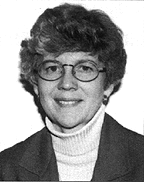NIDA MERIT Award winner Dr. Linda A. Dykstra investigates drugs that effectively relieve pain but have a low likelihood of being abused. Her behavioral pharmacology research at the University of North Carolina (UNC) at Chapel Hill is directed at how opioid receptors help bring about analgesia.
 Dr. Linda Dykstra
Dr. Linda DykstraDr. Dykstra is studying three opioid receptors-delta, kappa, and mu-and the ways that opioid pain relievers interact with them. Opioid receptors are molecules built into the walls of nerve cells. There are many kinds, each designed to receive - or bind with - a specific type of chemical. Morphine, like other currently licensed opioid analgesics, binds to opioid receptors to bring about pain relief, but leads to tolerance over time.
During the earlier part of her MERIT Award research, Dr. Dykstra found that the analgesic effects of morphine are determined in part by how the drug interacts with the mu receptor. "This kind of knowledge can direct us in developing new drugs that have morphine's analgesic effects, with less likelihood of possibly leading to physical dependence," says Dr. Dykstra.
Currently, Dr. Dykstra is exploring the effects of partial agonists. Partial agonists bind to opioid receptors and reduce pain, but they are not as powerful as morphine. Thus, they do not produce as strong a reinforcing effect, a key factor in the progression to drug dependency. Other opioid analgesics act on different opioid receptors, producing different effects.
Dr. Dykstra also is testing the analgesic effects of new drugs that bind with kappa and delta types of receptors. Moreover, she is turning her attention to opioids that interact with both mu and delta receptors. "The added benefit of these compounds is that they can produce strong analgesia but with less respiratory depression, another of morphine's unwanted effects," she says.
According to Dr. Dykstra, the MERIT Award has brought an important element of freedom to her research. "It has meant a long period of secure support during which I have had more freedom to change directions in response to discoveries in our laboratory as well as in the broader scientific community," says Dr. Dykstra. "It has allowed me to take more chances and engage in more innovative research."
Many students at the University of North Carolina at Chapel Hill have benefited from the research environment provided by Dr. Dykstra's MERIT Award. "It has allowed us to create an environment that is optimal for training new students, as the long period of secure funding gives the students a chance to pursue innovative ideas," explains Dr. Dykstra. "At least a dozen graduate and undergraduate students have been involved in the studies I've conducted since receiving the award."
Dr. Dykstra has studied the behavioral pharmacology of analgesics for nearly 20 years. In addition to the MERIT Award, she has received a NIDA Research Scientist Award. At present, Dr. Dykstra is director of a NIDA training grant for predoctoral training in research on drug abuse; she holds another research grant for the study of opioids' effects on immune function.
Dr. Dykstra served on NIDA's National Advisory Council on Drug Abuse from 1991 to 1994. In 1972, after receiving her Ph.D. in psychology from the University of Chicago, she was awarded a NIDA Postdoctoral Research Fellowship in pharmacology. Dr. Dykstra is the William Rand Kenan, Jr., Professor in the Departments of Psychology and Pharmacology at UNC-Chapel Hill.
